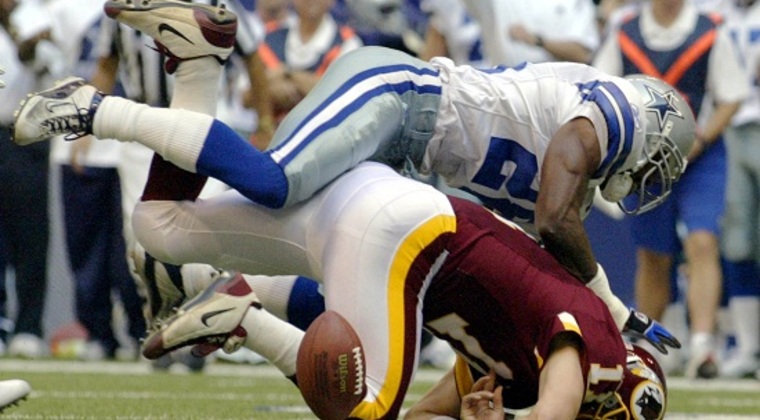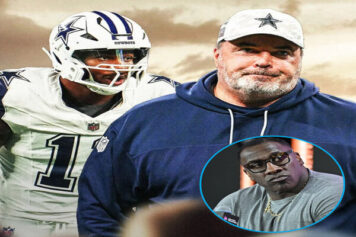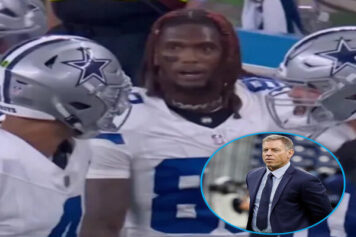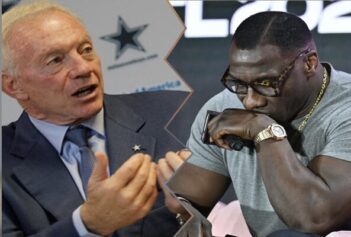This is Part II of our feature story on former Dallas Cowboy great and current ESPN NFL Analyst Darren Woodson.
If you missed Part I, you can read it here
Darren Woodson didnt walk into his initial training camp with the Dallas Cowboys as some wide-eyed rookie.
I always felt like, when I walked on the field, I was the best player there, he said. Thats how I always felt, even as a kid. I always told myself that I was the best because I knew Id prepared myself. I was confident in my abilities. It did not surprise me when I had to cover Emmitt Smith one-on-one coming out of the backfield, or when I had to line up in press coverage against Michael Irvin, and won some of those battles.
With his competitiveness and solid performances in training camp, Woodson was confident that hed be in the starting lineup. But Head Coach Jimmy Johnson had other ideas.
Listen, I dont trust you to start, Johnson told him. Ive got three guys that are veterans at the safety position. Youre not going to get a shot at the starting position. But youre going to be my nickel guy. Thats going to be your role on the team this year.
Woodson simmered and did not accept his coachs decision quietly.
I could care less if a guy had been playing for thirty years, said Woodson. I told Jimmy, I can outplay those guys, so give me a shot. I was upset. We had our discussions and I was very clear about how I felt. I was a young guy who had started my entire life. But the coaching staff was very clear that as a rookie, I was going to have to accept my role.
His job would be to wreak havoc on special teams and come in on passing downs to cover the slot receiver, or the tight ends in Dallas nickel defensive package.
With his ability to blow up running plays based on his experiences as a linebacker, and instincts and mastery of techniques that allowed him to effectively cover the slot receiver – a role that was normally handled by a cornerback – his diversified skills enabled the coaching staff to further unleash what was already a terrifying defense.
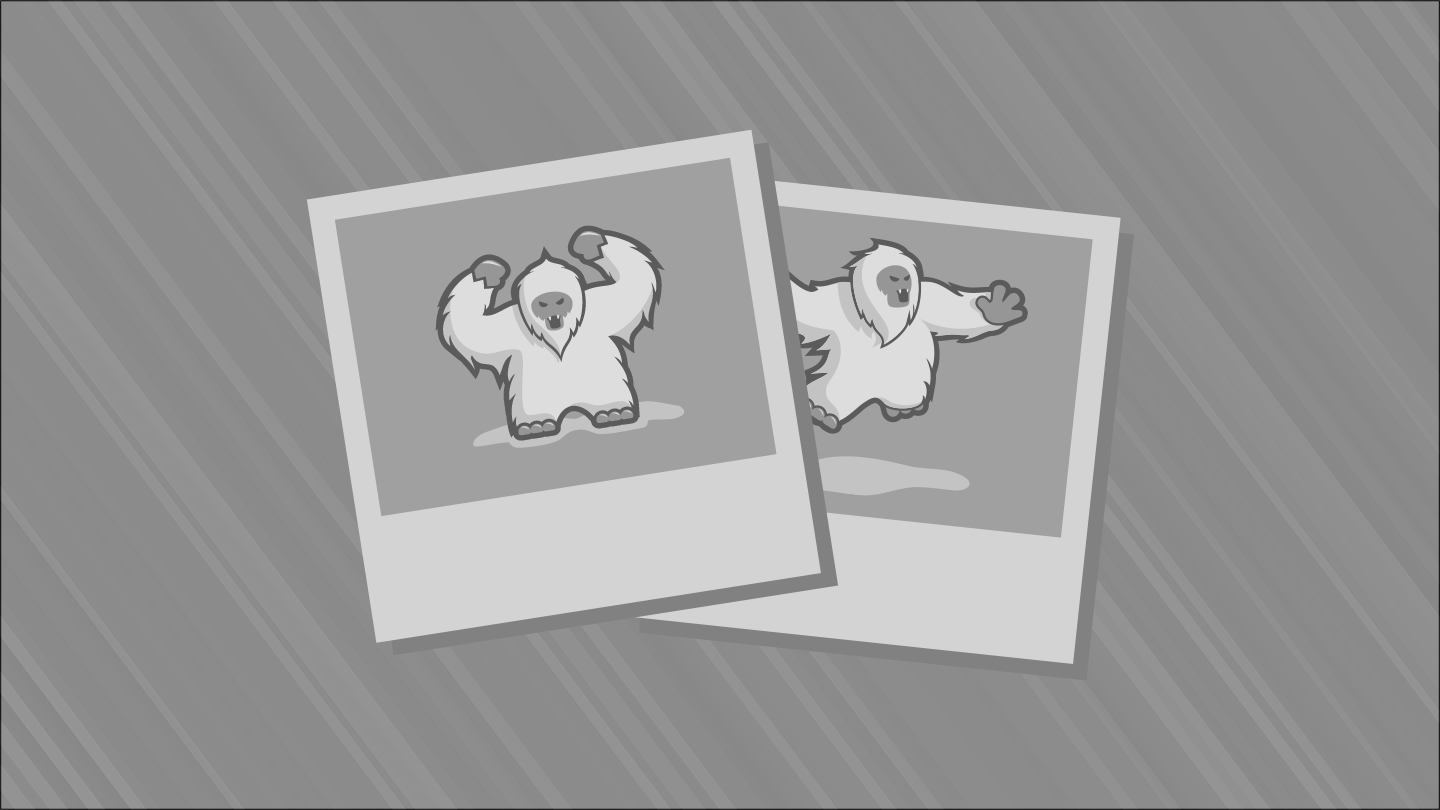
With Woodson playing up on the line of scrimmage and being malleable enough to stuff the run and blanket fleet-footed receivers, the Cowboys were able to open the blitzing floodgates and pressure opposing quarterbacks mercilessly.
And I thank Jimmy and Coach Campo, our defensive backs coach, so much for that, said Woodson, because they helped me work on my game in so many different ways that year. As a big safety who had transitioned from a linebacker in college, they transformed me into a safety-slash-cornerback. That entire first year, I was able to work on and perfect my coverage ability. Looking back on it, it was the best thing that could have happened.
He was never awestruck by being in the NFL. He wasnt impressed with, nor intimidated by the guys he lined up against. In his mind, he was simply doing what hed always done: playing a mean and intimidating brand of defensive football.
But one moment did give him pause, making him realize where he was, and what he ultimately wanted to accomplish.
We were in Los Angeles, playing the Raiders, said Woodson. It was during pre-game warm-ups, and Ronnie Lott ran out onto the field. He slapped me on my ass and said, Hey man, Ive been watching you play. Youre a damn good football player. And he just kept on running by. I didnt even know that he knew that I existed. Im just a nickel guy and a special teams guy. But that was my Wow! moment. I thought Emmitt and Troy were great football players, but when you see your childhood idol run by you and say something like that, that really made me say, Wow! I made to the NFL! Im on the same field as Ronnie Lott!
His rookie year coincided with the re-emergence and resurrection of the Cowboys franchise. With Nate Newton and Mark Stepnoski anchoring a dominant offensive line, Aikman, Smith, Irvin, tight end Jay Novacek and fullback Darryl Johnston began gouging defenses. With Ken Norton, Jr., Jim Jeffcoat, Charles Haley, Robert Jones and Tony Tolbert smothering opposing offenses, Dallas was suddenly the NFLs scariest team.
The season concluded with their 52-17 annihilation of the Buffalo Bills in Super Bowl XXVII.
After we beat Buffalo in that first Super Bowl, I walked into the locker room and saw guys like Mark Tuinei and Bill Bates, who had been in the league for years, laying on the ground crying, said Woodson. I was like, Man, we just won the game. Why are they crying? But I realized that those guys had been there for the lean years. Theyd been in the league so long and theyd never had a chance to experience that moment and win a championship. That was a huge wake-up call for me and I was like, Wow! This must really mean something.’
The Cowboys won the Super Bowl the next year as well, defeating the Bills again 30-13. Woodson became a starter and tallied 155 tackles, second on the team behind star linebacker Ken Norton, Jr.
But despite the seamless transition on the field, his off-the-field evolution was rife with challenges.
It was a huge transition from college to the NFL, Woodson said. I never had any money, so I had a lot to learn about being responsible for the cash I had in my pocket, and knowing where to go for financial advice.
Woodson did his due diligence in terms of selecting a financial advisor when he was coming out of Arizona State. The advisor that he chose, who the NFL vouched for in terms of his licensing and legitimacy, represented his former roommate and good friend Floyd Fields, whod played for the San Diego Chargers.
Three years into the league, I found out that Id been burned by my financial advisor, said Woodson. And I did all the research in the world. So the finances are one thing you have to deal with when you make the transition. Your family is another thing. People would say, You changed. Well, yeah, I did change because my circumstances changed. You have to know who your real friends and family are. I came from a strong family background, and that was great for me. They all had jobs and nobody was asking me to carry them. But you still have distant cousins and relatives who want-want-want and they dont understand that this is a short-lived game.
The average football player lasts for two to three years, and thats it, Woodson continued. Thats a hard thing to juggle friends, family and finances.
The other profound aspect of the transition was coming to the realization that football had now become a job. It sounds simple, but the mental adjustment can be a barrier that many never manage to overcome.
Its an absolute job, said Woodson. You get there every day at 6:30am, so you have to make sure that youre taking care of your body. You have to be disciplined in terms of studying, knowing and mastering the playbook. 90% of our day is spent in the classroom. People dont realize that we dont spend much time on the field. Most of our time is spent going over plays, knowing the game plan, knowing the other team and how theyre gonna attack us. Its repetitive film-work over and over again. Its constant, every single day with long hours spent in the classroom. Until I understood that it was a job, it was a hard, uphill battle.
When Woodson saw how the teams personnel apparatus operated, he saw a side of pro sports that hed never considered as a kid cheering for Terry Bradshaw, Lynn Swann, Franco Harris and the Pittsburgh Steelers.
Its not a game and they are always looking to replace you, he said. If they can get someone with your skill set that they can pay less, youre gone. Thats how it is.
After four years in the NFL, Woodson owned three Super Bowl rings. He fully expected to win a championship every year and took the franchises success for granted. But shortly after Jimmy Johnson left the franchise and the free agency market began siphoning away emerging and established talent, Woodson began noticing a marked deterioration in the teams culture.
In the ’96 playoffs, we lost to the Carolina Panthers and you could see the writing on the wall, said Woodson. After Jimmy left, our drafts got worse and worse. Jimmy brought in guys from a lot of different backgrounds who were all gym rats, guys who wanted it, who you didnt have to force anything out of, on the field. Those were the type of guys Id been accustomed to playing with during those championship years.
When you continually miss in the draft, you absolutely miss as far as wins and losses, Woodson continued. You build a team from the inside-out. We didnt do a good job as an organization of finding those players in the mid and late rounds, which was something that Jimmy was exceptional at. Our Super Bowl MVP in 1995 was Larry Brown, who was drafted in the 12th round. But we didnt draft well after Jimmy left and it showed. Before it showed in games, it showed in practice.
Even during his later years, Woodson was still playing on special teams. While the television announcers lauded the veteran for his willingness to do the dirty work that is normally reserved for young players fighting for a roster spot, he was unnerved with the responsibility.
My eighth year in the league, Im still running down punts, said Woodson. Every year, I thought Id be getting off the kickoff teams, but they didnt trust the guys that theyd drafted. Im watching other top safeties in the league like Brian Dawkins and George Lynch, and theyre not running down on special teams. It was a hard pill to swallow, going from a great football team to one that was way below average.
The Cowboys finished with a dismal 5-11 record for three consecutive years from 2000 to 2002. Woodson was still one of the NFLs best players, fiercest competitors and ferocious hitters. But the teams reversal from dominance to doormat affected him deeply.
My frustration really began to show because I was so disappointed in what was around me, he said. I was so disappointed in the collective work ethic and the overall mentality as an organization. Some of the guys could care less. We werent drafting gym rats any more. We were drafting guys that came in at 9:00am and left at 4:00pm. It was hard to deal with, especially when youre the captain and the leader and youre trying your best to win football games. You know what it feels like to have a good, disciplined team, and youre just not surrounded by that anymore.
In 2003, Bill Parcells was hired as the teams Head Coach and immediately changed the culture. Woodsons 12th year in the league saw the Cowboys finish 10-6. He figured that he had three good years left. But offseason surgery for a herniated disc could not get him ready for the start of his 13th training camp.
I had a bulging disc in my back and some serious nerve damage, said Woodson. I thought I would bounce back after the surgery. But my body couldnt get over the nerve damage.
He also had what is known as Drop Foot, where he had difficulty lifting the front part of his foot, which caused him to drag it on the ground as he walked. He was hopeful and encouraged during his rehab. But eventually, after his back continued to go dead on him, he realized that his career was over.
Hed bounced back from eleven previous surgeries. But there would be no return after his twelfth.

Woodson walked into Parcells office and somberly said, I cant do it anymore.
Emotionally, I was spent, said Woodson. I wasnt able to play with my kids, or do simple things like throw or punt a ball without experiencing some excruciating pain. Thats a reality check, man. I started thinking, What if I hurt my back again? Will I be able to walk again? Am I going to be able to do things in life that I want to do? Thats when I realized that I was done.
For 13 years, he was everything you could ask for unselfish, reliable, dependable, a team player first and a team leader always, Cowboys owner Jerry Jones said after Woodson announced his retirement. Hes a living, breathing example of the saying that character does matter. He was the first to buy into whatever our coaches were selling.
Although he only worked with him for one year, Parcells took an immediate liking to him.
Now that Ive gotten to know him, I think hes one of those people that you really think a lot of, Parcells once said. Hes the epitome of a professional, what he did in playing and his approach to the game. I have a high regard for him personally as well. Hes the kind of guy that makes this profession something that you like to engage in.
Despite being burned by his first financial advisor early on in his career, Woodson was frugal and did a great job of managing and holding onto the majority of the money he earned on the football field. But he needed to figure out what his next job would be.
One of the things about being with the Cowboys was that there were always cameras in the locker room, he said. “So I got a lot of reps with microphones in front of me and being able to talk to the camera.”
ESPNs Stuart Scott encouraged him to consider a career in broadcasting when his playing days were over. Woodson had done some color commentary for a few NFL Europe games while still an active player and he enjoyed the experience.
After one interview in 2003, his last year as an active player, Scott told him, Look, when you get done, you need to do this. You need to get in front of the camera. Im serious. My producers are in my ear saying that youre a damn good interview. You should think about it.
Woodson began to seriously ponder the opportunity when Parcells approached him after one practice during his final season.
When youre done playing, you need to do some TV, Parcells told him.
When Woodson walked into Parcells office to tell him that he was retiring, he coach stared at him with a pregnant pause.
Youre done? Youre positive? OK, then youre gonna do TV, Parcells told him. The Hall of Fame coach pulled out some notes from his desk and handed them to Woodson. These are the people that have been calling me about you. Have your agent call them.
To this day, I love Bill Parcells with all my heart, said Woodson. As a player, he changed the way that I looked at the game. And he meant so much to me as I was finishing my career.
Since his retirement, Woodson has worked at ESPN, where his analytical and communication skills place him way beyond the standard Ex-Jock on TV description. Hes smart, honest, engaging, thoughtful and is able to explain himself in ways that resonate with the hardcore and casual fan alike.
He also has a keen interest in startup businesses. In 2011, he became a founder in GuideHop, an online marketplace that offered a unique take on the tour guide experience.
His most recent venture, FanPrint, veers toward social entrepreneurship. One of the companys founding investors, along with being its current Director of Partnerships, Woodson was interested in investing in a fan-facing business that drew on consumer passion for the NFL , while simultaneously giving back to people in need.
Woodson met FanPrints CEO TK Stohlman through a Dallas incubator and start-up accelerator called Tech Wildcatters. After Woodson heard Stohlman give a presentation outlining the companys business model and vision, he agreed to become an angel investor during the companys formative stage.
We have a first of its kind licensing deal with the NFLPI, which is the marketing and licensing arm of the National Football League Players Association, said Woodson. The basic premise is to offer cool sports merchandise, which is actually created by and for the fans. Fans from around the world come up with their creative print. We look at it and the NFLPA looks at it and we decide if were going to put it on our site.

We have products right now for the top 100 players in the NFL, Woodson continued. Were trying to get Major League Baseball as well, and it looks like that deal is going to happen soon. Were also looking at soccer, the NHL and the NBA.
What makes the venture unique is that the company donates the entire licensing fee to the NFLPAs Player Assistance Fund.
Thats the thing that I really like about the company, said Woodson. That fund gives back to former players that have fallen on hard times. Guys today are really getting paid because of the influx of money from the television contracts, but those guys that played in the 60s, 70s, 80s and early ’90s, the modern pioneers of what the NFL has now become, a lot of those guys who live in Dallas that I see regularly are walking around in bad shape. Theyre absolutely struggling.
A lot of guys walk away ravaged by injury, and suffering from CTE and other brain traumas,” Woodson continued. “Theyre struggling with their health and finances. If what were doing with this partnership is able to help those guys, then weve done our job, Ive done my job, and weve made a dent.
For a guy who was once one of the greatest Dallas Cowboys ever, who played with a keen eye for the ball and a ferocity that gave opposing players nightmares, who limped away from the game with his own body ravaged, that sounds like a pretty honorable endeavor.
Always a leader on the field and off the field, maybe his latest play will inspire others to do the same.

